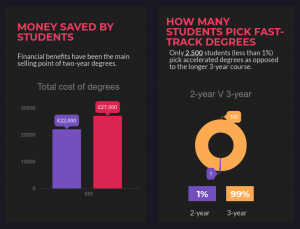EXPLAINED: All about the two-year degrees that saves students £25,000
The government are planning to introduce more two-year degrees that could save students up to £25,000, which will be available in 2019.
Universities minister Jo Johnson urged students to opt for accelerated degrees, which can save them £25,000 in the long run.
How much can students save?
The two-year degrees will cost 20% less than the three-year courses. Instead of a £9,000 per year tuition fee, accelerated degrees will cost £11,000 per year.
Mr Johnson explained that students will only pay £22,200 for their two-year degree as opposed to the total of £27,750 with a the typical three year course, freeing up £5,500. He then added the average starting salary of a graduate (£19,000), granted that they enter employment straight after graduation. In total, this meant that students who opted for an accelerated degree could save up to £25,000.

What are the benefits?
Saving time
Politics student at Durham University, Tom Harwood would have chosen a two-year degree if he was given the option.
He said: “Two-year degrees are a fantastic idea. There is so so much wasted time in three year degrees.
Guy Opperman MP recommends the accelerated degrees, having graduated from one at Buckingham University.
He said: “I did one of the first 2 year degrees at Buckingham University. I can really recommend them. There are 4 terms a year, featuring a term in the traditional summer holidays, less debt and more modular courses.
The Hexham MP said that Jo Johnson should expand on this idea as they are ‘progressive thinking’.
Straight into employment after two years
Kimberley Hutchinson was recently accepted into a primary education accelerated degree. She believes that the fast-track course is a good way for schools to tackle the teacher shortage in the country.
The NHS worker said: “I’m going to qualify a year earlier. It’s better to go down this route, especially with the teacher shortage.”
Kimberley is aware of the intensive workload of the degree and worried that it will increase drop-out rates.
She said: “I do think it’s really important for students to have to prove that they are capable of doing the accelerated degree.
“As a way to prevent future stress and failures. They need to feel that they can commit to the intensity.”
https://twitter.com/97laurajane/status/939842297079975938
Being ahead of three-year degree students
Abartay University are one of the pioneers of two-year courses and the only university in Scotland to offer the choice of accelerated degrees.
Head of the School of Social and Health Sciences, Andrea Cameron has led Abertay’s involvement in this area. Andrea has worked with the Higher Education Academy Flexible Journey webinar series, Universities UK Accelerated Degree Workshop and Quality Assurance Agency Viewpoint.
She said: “Taking on an accelerated degree is a fantastic option for students who want to get their foot on the career ladder as quickly as possible.
“This year saw the first cohort of Abertay students graduate from our accelerated programmes, entering the jobs market a year ahead of their peers.
“By condensing the time taken to achieve their qualification they have not only sped up access to a graduate salary, but also saved a significant amount on living and accommodation costs.
“Accelerated degrees feature all the same course content and are subjected to the same rigorous standards as programmes following a more conventional timetable.”
What are the drawbacks?
Higher yearly tuition fee
The annual tuition fee for an accelerated degree is £11,000 as opposed to the £9,000 for the standard three-year course.
Shadow Secretary of State for Education said that the government’s plan to increase fast-track degrees is simply another way to raise tuition fees.
As reported in the Huffington Post, Angela Rayner MP said: “It seems that every higher education policy from this government comes with another plan to raise tuition fees, with students on part time degrees now facing charges of over £11,000 a year.
“With universities facing uncertainty over Brexit, ministers must address concerns like the impact on staff workload before imposing more major changes.
“So far they have offered no concrete evidence that squeezing three years of learning into two will stem the huge drop in part-time students, or lead to better outcomes.”
No summer breaks
Students of two-year degrees will not have a summer break as the course consists of four terms that runs all throughout the year. Some critics are saying that this can have a detrimental effect on the student’s well-being.
Historian, Charlotte Riley said: “Students need time to develop ideas. They need time to intellectually grow.
“You can’t just ram three years into two and expect the same outcome.”
Takes the first year to adapt to being out of the home environment, make new friends and realise adult life. In an accelerated degree, where is the time for this?
— The Dr Lazzer (@The_Lazzer) December 10, 2017
Pressure
Others academics believe that the intensive nature of the degree can put too much pressure on the student which will result in failure.
Law lecturer and PhD researcher at City University, Alex Powell said: “I can totally accept that some people would suit accelerated courses. But from my experience, they’re definitely not for everyone.
“There are already enough pressures in a three-year degree programme.”
